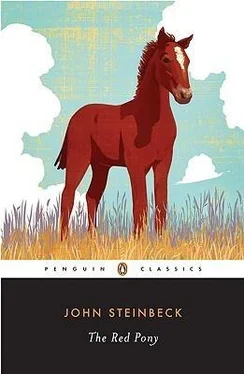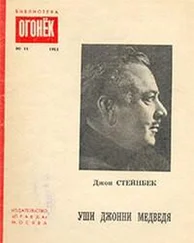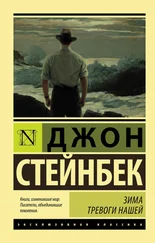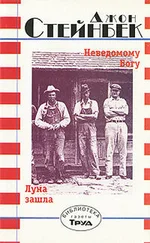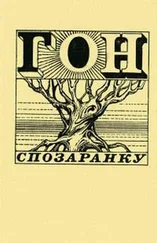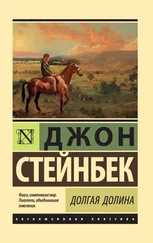It was daylight when he awakened. The barn door had swung open. The pony was gone. He sprang up and ran out into the morning light.
The pony’s tracks were plain enough, dragging through the frostlike dew on the young grass, tired tracks with little lines between them where the hoofs had dragged. They headed for the brush line halfway up the ridge. Jody broke into a run and followed them. The sun shone on the sharp white quartz that stuck through the ground here and there. As he followed the plain trail, a shadow cut across in front of him. He looked up and saw a high circle of black buzzards, and the slowly revolving circle dropped lower and lower. The solemn birds soon disappeared over the ridge. Jody ran faster then, forced on by panic and rage. The trail entered the brush at last and followed a winding route among the tall sagebrushes.
At the top of the ridge Jody was winded. He paused, puffing noisily. The blood pounded in his ears. Then he saw what he was looking for. Below, in one of the little clearings in the brush lay the red pony. In the distance, Jody could see the legs moving slowly and convulsively. And in a circle around him stood the buzzards, waiting for the moment of death they know so well.
Jody leaped forward and plunged down the hill. The wet ground muffled his steps and the brush hid him. When he arrived, it was all over. The first buzzard sat on the pony’s head and its beak had just risen dripping with dark eye fluid. Jody plunged into the circle like a cat. The black brotherhood arose in a cloud, but the big one on the pony’s head was too late. As it hopped along to take off, Jody caught its wing tip and pulled it down. It was nearly as big as he was. The free wing crashed into his face with the force of a club, but he hung on. The claws fastened on his leg and the wing elbows battered his head on either side. Jody groped blindly with his free hand. His fingers found the neck of the struggling bird. The red eyes looked into his face, calm and fearless and fierce; the naked head turned from side to side. Then the beak opened and vomited a stream of putrefied fluid. Jody brought up his knee and fell on the great bird. He held the neck to the ground with one hand while his other found a piece of sharp white quartz. The first blow broke the beak sideways and black blood spurted from the twisted, leathery mouth corners. He struck again and missed. The red fearless eyes still looked at him, impersonal and unafraid and detached. He struck again and again, until the buzzard lay dead, until its head was red pulp. He was still beating the dead bird when Billy Buck pulled him off and held him tightly to calm his shaking.
Carl Tiflin wiped the blood from the boy’s face with a red bandana. Jody was limp and quiet now. His father moved the buzzard with his toe. “Jody,” he explained, “the buzzard didn’t kill the pony. Don’t you know that?”
“I know it,” Jody said wearily.
It was Billy Buck who was angry. He had lifted Jody in his arms, and had turned to carry him home. But he turned back on Carl Tiflin. “’Course he knows it,” Billy said furiously. “Jesus Christ! man, can’t you see how he’d feel about it?”
In the humming heat of a midsummer afternoon the little boy Jody listlessly looked about the ranch for something to do. He had been to the barn, had thrown rocks at the swallows’ nests under the eaves until every one of the little mud houses broke open and dropped its lining of straw and dirty feathers. Then at the ranch house he baited a rat trap with stale cheese and set it where Doubletree Mutt, that good big dog, would get his nose snapped. Jody was not moved by an impulse of cruelty; he was bored with the long hot afternoon. Doubletree Mutt put his stupid nose in the trap and got it smacked, and shrieked with agony and limped away with blood on his nostrils. No matter where he was hurt, Mutt limped. It was just a way he had. Once when he was young, Mutt got caught in a coyote trap, and always after that he limped, even when he was scolded.
When Mutt yelped, Jody’s mother called from inside the house, “Jody! Stop torturing that dog and find something to do.”
Jody felt mean then, so he threw a rock at Mutt. Then he took his slingshot from the porch and walked up toward the brush line to try to kill a bird. It was a good slingshot, with store-bought rubbers, but while Jody had often shot at birds, he had never hit one. He walked up through the vegetable patch, kicking his bare toes into the dust. And on the way he found the perfect slingshot stone, round and slightly flattened and heavy enough to carry through the air. He fitted it into the leather pouch of his weapon and proceeded to the brush line. His eyes narrowed, his mouth worked strenuously; for the first time that afternoon he was intent. In the shade of the sagebrush the little birds were working, scratching in the leaves, flying restlessly a few feet and scratching again. Jody pulled back the rubbers of the sling and advanced cautiously. One little thrush paused and looked at him and crouched, ready to fly. Jody sidled nearer, moving one foot slowly after the other. When he was twenty feet away, he carefully raised the sling and aimed. The stone whizzed; the thrush started up and flew right into it. And down the little bird went with a broken head. Jody ran to it and picked it up.
“Well, I got you,” he said.
The bird looked much smaller dead than it had alive. Jody felt a little mean pain in his stomach, so he took out his pocketknife and cut off the bird’s head. Then he disemboweled it, and took off its wings; and finally he threw all the pieces into the brush. He didn’t care about the bird, or its life, but he knew what older people would say if they had seen him kill it; he was ashamed because of their potential opinion. He decided to forget the whole thing as quickly as he could, and never to mention it.
The hills were dry at this season, and the wild grass was golden, but where the spring-pipe filled the round tub and the tub spilled over, there lay a stretch of fine green grass, deep and sweet and moist. Jody drank from the mossy tub and washed the bird’s blood from his hands in cold water. Then he lay on his back in the grass and looked up at the dumpling summer clouds. By closing one eye and destroying perspective he brought them down within reach so that he could put up his fingers and stroke them. He helped the gentle wind push them down the sky; it seemed to him that they went faster for his help. One fat white cloud he helped clear to the mountain rims and pressed it firmly over, out of sight. Jody wondered what it was seeing, then. He sat up, the better to look at the great mountains where they went piling back, growing darker and more savage until they finished with one jagged ridge, high up against the west. Curious secret mountains; he thought of the little he knew about them.
“What’s on the other side?” he asked his father once.
“More mountains, I guess. Why?”
“And on the other side of them?”
“More mountains. Why?”
“More mountains on and on?”
“Well, no. At last you come to the ocean.”
“But what’s in the mountains?”
“Just cliffs and brush and rocks and dryness.”
“Were you ever there?”
“No.”
“Has anybody ever been there?”
“A few people, I guess. It’s dangerous, with cliffs and things. Why, I’ve read there’s more unexplored country in the mountains of Monterey County than any place in the United States.” His father seemed proud that this should be so.
“And at last the ocean?”
“At last the ocean.”
“But,” the boy insisted, “but in between? No one knows?”
“Oh, a few people do, I guess. But there’s nothing there to get. And not much water. Just rocks and cliffs and greasewood. Why?”
Читать дальше
